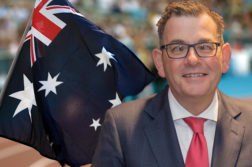Last night Labor MPs Chris Bowen and Daryl Melham launched Nick Cater’s new book The Lucky Culture, with help from Daily Telegraph editor Paul Whittaker.
Cater, a News Ltd editor, journalist and executive, who migrated to Australia from the UK in the late 1980s, is an avowed convert to Aussie egalitarianism. “[S]omething particularly refreshing hangs in the egalitarian breeze as soon as you step off the plane,” Cater writes — a breeze that blows most bracingly in the western suburbs of Sydney. As Whittaker said at the launch, held at the Revesby Workers’ Club, “much of the coming ideological battle will be fought in Sydney’s west”.
In The Lucky Country, Cater worries about a cultural elite characterised by moralism, intellectual conceit and snobbery, who tell the rest of us what to do. (Not the ones launching and praising his book, of course.) Since Cater arrived in Australia he reckons he has witnessed the emergence of a new “moral class” (the commissioner class, the knowledge class, “latte sippers”, progressives, the “plastic bag refuseniks”, the “bunyip aristocracy”). The moral class are responsible for plain-packaged cigarettes and the persecution of Andrew Bolt, and they’re having a dire effect on the ALP and the country.
According to Cater, the crux of the problem is that "for the first time there are people who did not simply feel better off but better than their fellow Australians". You don’t need a history degree to demonstrate that this assertion is incorrect; Guy Rundle does an excellent demolition job on Cater’s historical arguments so I’ll leave it to him. For those who want to judge for themselves, there’s an excerpt from Cater’s book here.
By the time everyone had gathered in Revesby last night, the big book shivoo for the day had already taken place. Yesterday morning, John Howard launched The Lucky Culture at the Art Gallery of NSW. He said he’d been given his copy by Rupert Murdoch in New York. Former Quadrant and Bulletin editor Peter Coleman made a few remarks and the crowd drank champagne.
Even though it was only launched yesterday, an audience has already been carved out for The Lucky Culture. It’s on its third reprint and columns have been written about it by Cater’s News Ltd colleagues Miranda Devine ("Cater’s book is the spiritual sustenance our maligned nation needs”) and Janet Albrechtsen (“a new book that makes a major contribution to the cultural archeology of this nation”). Piers Ackerman got excited about The Lucky Culture in the Daily Telegraph (“extraordinary book”) and Tony Abbott reviewed it for The Spectator (“beautifully written and perceptive book”).
If the advance publicity is impressive, so too is the launch program. Next week historian Geoffrey Blainey will launch The Lucky Culture in Melbourne at the IPA. Kevin Rudd will launching the book in Brisbane, Bill Leak and HG Nelson will send it off in Woy Woy (tickets $40 a pop).
I sat up the back at the Revesby Workers’ Club launch; there weren’t more than 50 people in attendance. Behind me, a group of late arrivals chatted about their first trip to Revesby and laughed about getting lost on the way. This awkward spirit of bipartisanship defined the event. Cater chuckled when he said the western Sydney launch was the most important one of the day and told an anecdote about cycling without a helmet in Kirribilli. Whittaker made jokes about an unemployed hairdresser living in the Lodge. Daryl Melham, the president of the Revesby Workers’ Club, got a few digs in at John Howard: “I’m sorry John Howard couldn’t make it. Last time he came here he was campaigning against me and I got a swing my way”.
So let’s get to it: Why on earth would Chris Bowen agree to launch a book so unfriendly to the ALP? The former frontbencher addressed this question directly. Debate is important, he said. The ALP needs to listen to criticism and respond to it.
Bowen agrees with Cater insofar as the emergence of “a growing well-educated high income cohort with different views” is concerned – but not on the influence of that group on the Labor party. Last night he argued that the ALP needs to focus on economic growth and jobs – and pointed to a tradition of Labor leaders who had done just that. Whitlam, Wran, Keating and Hawke were his leading examples, the ones the party should be following now. Their history of reform and popularity, he claimed, is the proof that Labor thrives when it does not embrace “soft elite doctor’s wives issues” – such as a more humane immigration policy.
Reflecting on his time as Immigration Minister, Bowen recalled that he was criticised for pandering to the “racist voters of western Sydney” as he spearheaded the Gillard Government’s policy on asylum seekers. The elites don’t understand “asylum policy in the real world”, he said. Everybody else understands that “Australia can help but that we need an orderly and fair system”.
And so it went on, imaginary elites and imaginary ordinary aspirational voters.
Everything said they wanted robust and civil debate to flow from the publication of Cater’s book – but the only real instance of anything like this at the Revesby Workers’ Club last night was Melham’s gallant defence of the Racial Discrimination Act. “True equality requires differential treatment. Aboriginal people deserve a lot better than what they’ve received,” he said. The protections afforded Indigenous people by the RDA are about more than free speech, no matter what Andrew Bolt might claim. There were a few shuffles from the News Ltd crowd at this point.
Higher education has always been a battleground in the culture wars. When Bowen defended the Rudd-Gillard support for tertiary education the contradictions in the “elites” caricature quickly emerged: “We have a stronger economy and fairer society if we have more people going to university,” he claimed, as long as the ALP doesn’t follow an “elitist tertiary-driven agenda”.
Cater has mixed views on university education. As he put it, “it’s not that people go to uni, that’s not the problem. It’s what you think when you come out, whether you believe your own bullshit”. To call this anti-intellectualism is to concede too much ground. It sounds like a provisional license for university graduates. Use your newfound skills to get ahead, to contribute to the economy – but leave your big ideas on campus. Just who is talking down to the aspirational voters here? It’s hardly a prescription for a free culture of debate, let alone one which fosters innovation and critical thinking.
There are certainly groups in Australia who hold views that are at odds with Cater and Bowen – but they’re not holding the country or the Labor Party to ransom. Mining, taxation, environment policy and immigration are all divisive issues, however there’s scant evidence that the consensus is swinging to the left. For instance, two-thirds of Australians favour same-sex marriage, dubbed a polarising issue by Cater and Bowen, but their views have little sway when it comes to making legislation. The notion of a powerful progressive cultural elite is a fantasy, one which serves to advance the political agenda of genuinely powerful people like Cater, Whittaker and Bowen.
Speaking of fantasy, we might as well close with Cater’s presentation of his experiences in Australia as an exemplary migrant story. “The promise that the humblest migrant could through enterprise and energy earn enough to buy property and land was at the heart of the Australian dream from the beginning,” he writes. Last night he framed himself as a “refugee from Thatcher’s Britain”, a line that’s been trotted out a few times in the media blitz. The Lucky Country makes plenty of smug, dumb claims – but nothing is more telling than Cater’s casual claim that he’s some kind of refugee.
“Someone who is unable or unwilling to return to their country of origin owing to a well-founded fear of being persecuted for reasons of race, religion, nationality, membership of a particular social group, or political opinion”. That’s what it says in the Geneva Convention and that’s the definition that asylum seekers languishing in detention centres are desperate to show they meet. It doesn’t apply to a journalist who decided he’d like a lifestyle change. His story of the migrant made good by diligent assimilation to Australian egalitarianism – with a little help from News Limited – is, at best, disingenuous. As the politicians and commentators with whom Cater aligns himself pull Australia further and further away from adherence to the key document of international law, it’s a dishonest, morally bankrupt claim.
I’m aware that pointing this out is probably what Cater would, with a sneer, gloss as a typically censorious and humourless reflex of the commissioner class. I’d like to think of it as upholding another good old Aussie tradition – a low tolerance for self-serving bullshit. That tradition is being undermined by the genuinely powerful audience lapping up The Lucky Culture. This being so, we may do well to treat Cater’s book as an indication of the cultural politics we can expect under a Coalition government. What’s on the cards? Cynical populism dressed up as egalitarianism, hypocrisy, a readiness to circulate convenient, glib untruths – and a galling, smiling, smugness.
Donate To New Matilda
New Matilda is a small, independent media outlet. We survive through reader contributions, and never losing a lawsuit. If you got something from this article, giving something back helps us to continue speaking truth to power. Every little bit counts.



